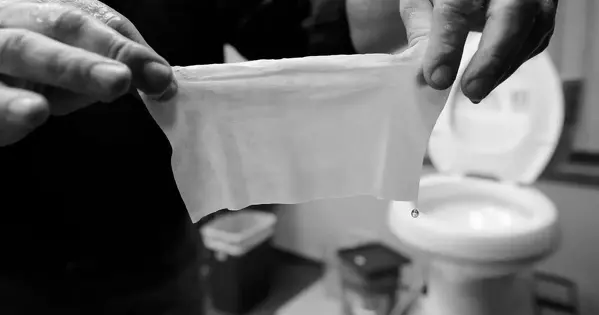As a new homeowner, you may have come across a product called flushable wipes. Like traditional toilet paper, flushable wipes are designed for personal hygiene, but they also offer the convenience of being disposable in toilets. However, are they really safe for your plumbing system and the environment? This post seeks to shed light on the pros and cons of flushable wipes.
Table of Contents
What Exactly Are Flushable Wipes?
Flushable wipes, as the name suggests, are a type of wet wipe designed to be disposed of in toilets. They’re often infused with elements such as aloe and vitamin E to increase their effectiveness and provide added comfort during use. This product has gained popularity as a go-to alternative to standard toilet paper due to the convenience they offer and their improved cleaning abilities.
The Perks of Using Flushable Wipes
Flushable wipes provide a level of convenience that traditional toilet paper simply cannot match. They come in easy-to-use, portable packaging, making them a practical solution for on-the-go hygiene needs. This makes them an excellent companion for travel, camping, or any other circumstance where regular bathroom amenities might not be readily available.
In addition to their convenience, flushable wipes often deliver a superior cleaning experience. Many users have noted that they feel fresher and cleaner after using these wipes as opposed to regular toilet paper. This quality can be particularly beneficial for parents assisting young children in their toilet training journey. It offers an easier, more thorough method of cleanliness, which can be a significant advantage during this often challenging period.
Beyond cleanliness and convenience, the comfort factor is another notable advantage. Flushable wipes are typically infused with moisturizing ingredients like aloe and vitamin E. These additions can provide a soothing effect, reducing irritation that can sometimes result from the use of dry toilet paper. This can be particularly beneficial for those with sensitive skin or those who require frequent bathroom use.
It’s also worth mentioning that flushable wipes can serve a variety of purposes beyond bathroom hygiene. They can be useful for quick clean-ups around the house or for freshening up when a full shower isn’t an option. Their versatility and convenience have made them a popular choice in many households.
However, it’s crucial to remember that while these benefits are attractive, they should be weighed against the potential downsides. The next sections will delve deeper into the potential risks and environmental implications of using flushable wipes.
The Hidden Risks of Flushable Wipes
Despite their promise of convenience, flushable wipes carry some not-so-obvious risks. Though they’re touted as safe for your toilet, they don’t break down as rapidly as their traditional toilet paper counterparts. This slow disintegration can lead to unwelcome blockages in your home’s plumbing system. Wastewater treatment specialists are all too familiar with the challenges posed by these wipes, reporting an uptick in clogs and equipment malfunctions associated with their usage.
Notably, the impact of these wipes can be especially detrimental to older plumbing systems. Unlike modern pipes, these older structures may not be equipped to handle the heftier disposal demands of flushable wipes, making them more susceptible to damage. What starts as a minor inconvenience can escalate into an expensive repair or even a full-blown replacement project.
Additionally, the problem isn’t confined to your home. City sewage systems are equally vulnerable to the issues caused by these wipes. Regular overloads of undissolved wipes can disrupt the functioning of municipal wastewater treatment facilities, potentially affecting entire communities.
In essence, while flushable wipes might offer a quick fix for your personal hygiene needs, they carry a hidden cost that can be a drain on your wallet and a strain on your home’s plumbing and municipal sewage systems. While they may slide down the toilet with ease, their journey beyond that point is where the real trouble begins. The consequences are far-reaching and can be severe, making it crucial to consider these hidden risks before deciding to incorporate flushable wipes into your bathroom routine.
Impact on the Environment
The environmental footprint of flushable wipes is significant and problematic. Despite reaching the sewage systems, these wipes often don’t disintegrate completely and contribute to the formation of ‘fatbergs’. These are sizable solidified masses of waste that can obstruct and block sewage systems, leading to expensive and time-consuming cleanup operations. Furthermore, the composition of these wipes usually includes synthetic fibers, which are not readily biodegradable. This results in a steady accumulation of non-decomposable waste in our landfills.
What’s more, there’s the potential risk of these wipes bypassing wastewater treatment plants and entering our natural waterways, contributing to pollution and harming aquatic life. The widespread use of flushable wipes can thus result in severe environmental ramifications, causing harm far beyond your bathroom and necessitating a broader conversation about responsible disposal practices.
Assessing the Costs
Using flushable wipes might seem like an economical decision initially, especially when considering the convenience and comfort they offer. However, a comprehensive analysis of the costs associated with their use can paint a different picture. While the upfront cost of these wipes is typically higher than that of regular toilet paper, the long-term financial implications can be even more substantial. The heightened risk of blockages and potential damages to your home’s plumbing system could lead to costly repair services, which may outweigh the initial savings you might enjoy from the use of flushable wipes.
Furthermore, the overall societal costs stemming from the environmental issues associated with these wipes cannot be overlooked. The undissolved wipes can create ‘fatbergs’ in city sewage systems, leading to expensive and labor-intensive cleanup operations. Additionally, the accumulation of non-biodegradable waste in landfills represents another indirect cost of using flushable wipes. The continuous reliance on these wipes could contribute to environmental pollution and degradation, which would necessitate remedial measures and cleanup efforts at the societal level. These substantial hidden costs might make flushable wipes a less cost-effective choice than initially perceived.
In essence, the comprehensive costs associated with the use of flushable wipes go beyond their initial price tag, considering the potential plumbing damage, repair costs, and environmental implications. As such, understanding these costs can help inform your decisions regarding their use, ensuring you make choices that are not only beneficial for your personal comfort and convenience but also financially and environmentally responsible.
Making an Informed Decision
Choosing to incorporate flushable wipes into your hygiene routine is a decision that rests heavily on personal needs and values. These products undeniably offer a level of comfort and convenience that regular toilet paper can’t match. They can be particularly useful for on-the-go situations or assisting young children during their toilet training phase. However, it’s equally important to consider their potential drawbacks.
The negative impact on your home’s plumbing system is a significant concern. Even if your system is new and robust, the possibility of blockages and subsequent repair costs is a reality. This is especially true for homes with older plumbing systems that may be more susceptible to damage from the hefty disposal demands of these wipes.
Beyond the confines of your home, the effects on municipal sewage systems and the environment should also be taken into account. The increased workload on wastewater treatment facilities, the formation of ‘fatbergs’, and the potential harm to aquatic life due to pollution are significant issues that extend the implications of using these wipes far beyond your bathroom.
Financially, the use of flushable wipes may seem attractive at first glance. However, the potential for higher repair costs and their generally higher price tag compared to regular toilet paper might make them less cost-effective in the long run.
Ultimately, the choice is yours to make. Prioritize what matters most to you – be it comfort, convenience, cost-effectiveness, or environmental impact. Knowledge is key in making decisions that align with your values and needs while also being responsible towards your home and the broader community. Remember, as a homeowner, the choices you make can significantly influence the health and longevity of your home’s systems, as well as the well-being of our planet.
FAQ’s About Flushable Wipes
Is it true that flushable wipes may be flushed down the toilet?
They are often manufactured with non-biodegradable synthetic materials such as plastics or polyester so that they do not deteriorate. Therefore, even if you flush them down the toilet, they will eventually block our sewers. This results in significant expenses as well as dangerous risks for the sewage professionals who are responsible for breaking up the jams.
Do plumbers advise the use of wipes that can be flushed?
The response is a resounding and unequivocal no. They have been around for quite some time, but the vast majority of people are unaware that they are not designed to be used in plumbing since they do not degrade very quickly.
How much time does it take for flushable wipes to decompose?
Within twenty-four hours, a single strip of toilet paper should have completely dissolved. Unfortunately, it might take weeks for wipes to totally break down into their component parts. If enough wipes are able to stick together inside of your sewer system, they can produce a large blockage, which could result in you having to pay hundreds or even thousands of dollars for plumbing repairs.
Does the toilet become clogged when you flush flushable wipes?
The common misconception is that they dissolve, but in reality, they do not. Instead, they will clump together inside your pipes, which will result in serious blockages. It’s possible that flushing wipes down the toilet won’t cause any problems right away, but those problems will begin to arise once the wipes reach the sewage system. Additionally, they are capable of wreaking havoc on the local wastewater treatment plant.
Conclusion
It is essential to have the understanding that only because something is labeled as “flushable” on the packaging does not indicate that it vanishes into thin air when it is flushed down the toilet. The same is true for toilet paper, but we’ll say it again: flushable toilet wipes ARE capable of being flushed down the toilet, but doing so increases the likelihood that the toilet will become clogged.

